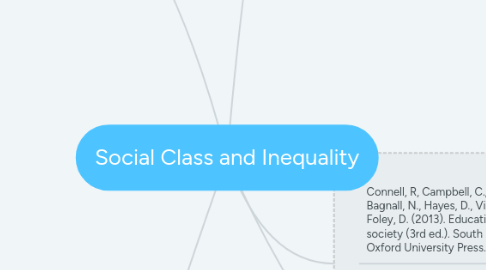
1. Social Class Theorist
1.1. Karl Marx (1818-1833)
1.1.1. The role of education
1.1.2. Challenging social class and inequality
1.1.3. Most influential Western theorist in social class
1.1.4. Relation between society and economics
1.1.5. Theory of alienation to convey how the capitalist system is isolating and even dehumanising
1.1.6. The Capitalist class is controlling the ideology in society
1.1.7. Divide between the working class and the capitalist class
1.1.8. Working and capitalist classes
1.2. Max Weber (1864 - 1920)
1.2.1. German sociologist who developed influential theories on social class and inequality
1.2.2. He suggests two main class divisions beyond Marx's working and capitalist classes
1.2.3. Four classes
1.2.3.1. 1. Propertied Upper Class
1.2.3.2. 2. Upper Middle Class
1.2.3.3. 3. Lower Middle Class
1.2.3.4. 4. Working Class
1.2.4. Social stratification is not solely determined by wealth
1.2.5. Class groups are formed through the related dynamics of status , political power and welath
1.2.6. Concept of 'life chances' which are opportunities to achieve economic prosperity
1.2.7. Individual life chances were linked to social stratification
1.2.8. Challenges the idea that people are fixed for life in certain classes and it will influence our lives
1.3. Pierre Bourdieu (1930-2002)
1.3.1. French sociologist
1.3.2. Giving us an understanding how social power is demonstrated in the classroom and in schools
1.3.3. Social Structures and processes play a huge role
1.3.4. Proposed that social stratification did not occur only through economic circumstance like Weber
1.3.5. Class hierarchies are formed through cultural factors, educational processes and social relationships
1.3.6. He theorised that class power is accumulated through the interrelated resources of cultural capital, social capital and economic capital
1.3.7. Class hierarchy and social power
2. Facts
2.1. The educational system needs to analyse how we can make education more equal in society
2.2. Teachers influence the lives of learners through their pedagogical strategies, movitivating students
2.3. The is a gap between the social economic status with the poor and rich is getting bigger
2.4. Schooling is expanding
2.5. Social class plays a big role in inequality in Australia
2.6. The My School website shows data on Australian schooling to the public (www.myschool.edu.au)
2.7. Social Class theories were emerged from specific social, cultural and economic conditions
3. Schooling System
3.1. Supporting students who may not understand the content or those who may be falling behind
3.1.1. e.g Workshops, a relief teacher or translator in the classroom
3.2. Promoting equal opportunities for students to succeed
3.3. Enabling students to have a fair go in education
3.4. Socially integrating students
3.5. Promoting a loving, safe, supportive classroom environment
3.6. Applying the school ethos or vision in the classroom
3.7. Applying the Melbourne Declaration of Educational Goals for Young Australians
3.8. Private, Public and Government Schooling Systems
3.8.1. School Funding or needs-based funding Commonwealth policies
3.9. Teachers
3.9.1. Develop pedagogical practices to develop students learning capabilities
3.9.2. Develop their understanding in the classroom environment
3.9.3. Valuing students differences e.g their culture and background
3.9.4. Providing opportunities for both advantage and disadvantage students
3.9.5. Promoting equal opportunities for students in the schooling environment
4. Key Definitions
4.1. Social Stratification
4.1.1. The division of people into groups based on their social position.
4.2. Working Class
4.2.1. The socioeconomic group that works for wages and does not own the means of production.
4.3. Capitalist Class
4.3.1. Socio-economic group that owns capital and controls the systems that produce capital and ruling ideas (ideology).
4.4. Knowledge Economy
4.4.1. An economy that is largely based on the creation and trade of information and knowledge-based services, rather than the creation and trade of tangible goods.
4.5. Ideology
4.5.1. In Marxist terms, the configuration of controlling beliefs used by those in power to maintain and reinforce their positions.
4.6. Life Chances
4.6.1. The opportunities for social advancement to which individuals and social groups have differential access.
4.7. Cultural Capital
4.7.1. The knowledge, skills, dispositions and social tastes that can provide access to social power.
4.8. Social Capital
4.8.1. The resources available to a person through social membership, networks and relationships, which can provide access to social power.
4.9. Educational Codes
4.9.1. The social practices and knowledge that are valued in educational domains; educational codes reflect class relations, and they can be explicit or hidden.
4.10. OECD: The Organisation for Economic Cooperation and Development
4.10.1. A forum of thirty-four developed nations established in 1948 for the purpose of promoting economic stability; among other things it carries out an annual program of student assessment in literacy and numeracy.
